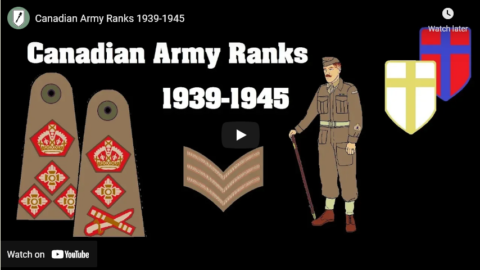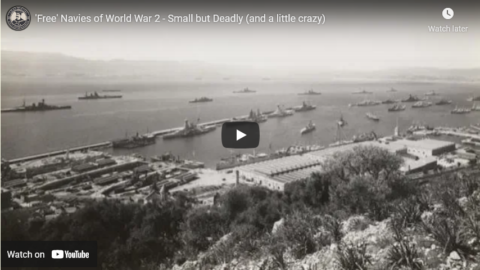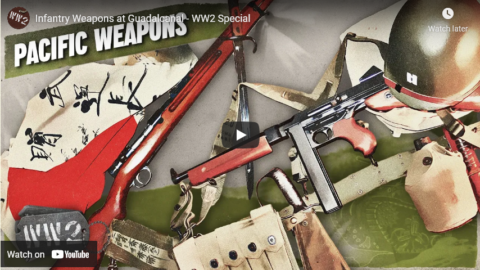World War Two
Published 21 Aug 2021The Axis advance in the Caucasus takes Mt. Elbrus, and the one on Stalingrad continues, and there are several raids of note this week- a Japanese one on Guadalcanal is destroyed, an Allied one on Dieppe is badly savaged, and an American one at Makin Atoll is successful in the short term, but with bad long term ramifications.
(more…)
August 23, 2021
Swastika Raised on Highest Point in Europe – WW2 – 156 – August 21, 1942
Canadian Army Ranks 1939-1945
HandGrenadeDivision
Published 6 Sep 2019A brief video describing the ranks used by the Canadian Army in the Second World War, with an equally brief introduction to the General Staff system.
Further reading and resources regarding the Canadian Army of the Second World War:
Service Publications
canadiansoldiers.com
http://www.canadiansoldiers.com
Department of National Defence Directorate of History and Heritage
August 21, 2021
“Free” Navies of World War 2 – Small but Deadly (and a little crazy)
Drachinifel
Published 13 Aug 2019Today we take a brief look at the various “Free” navies that operated with the Royal Navy and how that interaction played out across the years of conflict.
Want to support the channel? – https://www.patreon.com/Drachinifel
Want a shirt/mug/hoodie – https://shop.spreadshirt.com/drachini…
Want a medal? – https://www.etsy.com/uk/shop/Drachinifel
Want to talk about ships? https://discord.gg/TYu88mt
Want to get some books? www.amazon.co.uk/shop/drachinifel
Drydock Episodes in podcast format – https://soundcloud.com/user-21912004
August 18, 2021
The Conscripts and Conscientious Objectors of World War Two – WW2 Special
World War Two
Published 17 Aug 2021In keeping with their ideals of personal liberty, Britain and the United States have historically maintained relatively small armies made up of volunteer soldiers. When Germany and Japan mobilize huge numbers of well-trained conscripts and sweep across Europe and Asia, the democratic allies devote huge resources to closing the gap, while respecting the rights of those who object to fighting on moral grounds.
(more…)
Tank Chats #120 | Sd.Kfz. 234 Panzerspähwagen | The Tank Museum
The Tank Museum
Published 26 Mar 2021The Tank Museum’s Curator David Willey presents a Tank Chat on the Sd.Kfz. 234 Panzerspähwagen, a heavy German reconnaissance vehicle from the Second World War, and the only wheeled German armour in The Tank Museum collection. Join David as he tells you more.
Support the work of The Tank Museum on Patreon: ► https://www.patreon.com/tankmuseum
Visit The Tank Museum SHOP & become a Friend: ►tankmuseumshop.orgTwitter: ► https://twitter.com/TankMuseum
Instagram: ► https://www.instagram.com/tankmuseum/
#tankmuseum #tanks
August 15, 2021
No Soviet Oil for Hitler – WW2 – 155 – August 14, 1942
World War Two
Published 14 Aug 2021The Axis advance into the Caucasus is going great … except the oil towns they take have no oil, and wasn’t that the whole purpose? Meanwhile in the Pacific, the US Navy is suffering perhaps its greatest defeat ever off Savo Island, even as the Marines take Tulagi, Gavutu, and Tanambogo.
(more…)
August 14, 2021
Infantry Weapons at Guadalcanal – WW2 Special
Update: The folks at the World War Two channel have taken down this video due to technical errors in the script. Here’s their explanation.
World War Two
21 hours ago
Video on Infantry Arms at Guadalcanal retracted. Indy explains why:Hi everyone. Indy here. As most of you know, I do the research and writing for all of the regular weekly episodes here. I host many of the specials as well, though I do not do the research for most of them- occasionally so, if it’s something that’s really in my field of expertise, like geopolitics, strategy, personal stories, communications, and international relations. The research for the other specials is done by a variety of specialists in their fields or historians, so we can maintain the quality you’ve come to expect from us. I understand, though, that many of you have serious issues with the research for the Guadalcanal infantry special. Our apologies for that- the research was done by an historian, a PhD [student], actually, and we also ensured it was double fact-checked, but obviously some serious mistakes slipped through. Live and learn. I will say that I think it is important that you continue to tell us when you take issue with something we present, since we strive to make the most complete and accurate documentary series possible, so although some of them are hard to read we appreciate such feedback from our community.
And this is from the researcher who worked on the script:
Marlon Londoño
18 hours ago
Hey guys! This is Marlon, the PhD student in question who helped with the researching and writing of the episode. Just to give a little background, I’m a volunteer researcher who helps with the channel over the summer while I’m not teaching/researching/taking coursework. I’m a military historian and my main academic focus is on social and cultural military history (i.e. what people’s wartime experiences were like and why. I’m especially interested in how people justify wartime violence and oftentimes the types of weapons they use play a role in that mental process, so that’s the context in which I usually think about weapons on the battlefield).I’m sorry that I let a lot of you down with the mistakes about the Garand and Arisaka, among others. To be honest, I was surprised to learn they were myths. But I certainly know now, and I don’t think I’ll be forgetting any time soon 😅 One thing that I firmly believe as a researcher and educator is that nobody has a monopoly on the truth, least of all me. I tell that to my students on the first day of class each semester. I certainly don’t presume that the degree I’m pursuing makes me infallible or instantly qualified for anything. And this was a classic example of just how wrong I can be sometimes!
For what it’s worth, I love war history just as much as anyone else in the community, and I’m sorry that my research wasn’t as rigorous as it might otherwise have been. I hope you all might be willing to give any future episodes of mine a second chance, and of course I’m all ears for any mistakes that you want to point out!
August 13, 2021
Spycraft and the Special Operations Executive – WW2 – Spies & Ties 07
World War Two
Published 12 Aug 2021Astrid talks about spying all the time, but what was it actually like for people on the ground? We look through the lens of the British Special Operations Executive (SOE) to find out!
(more…)
August 12, 2021
QotD: Ignoring the warnings
… on Dec. 7, 1941, a U.S. Army Air Force lieutenant was spending his first-ever shift with a radar unit atop some Hawaiian high ground. Radar was brand new technology, and the U.S. was still figuring out how to best use it. The poor lieutenant watched on a scope as a big blob of something approached the naval base. He assumed it was a bunch of friendly planes coming in from the U.S. — what else would it be, right? Besides, even if he had been worried, there was no established protocol to sound an alarm. Forty-some-odd years before the release of Ghostbusters, the poor lieutenant was living the iconic tagline — when there’s a big mass of planes flying toward your base, who ya gonna call? And so the lieutenant and his men could only watch Japan’s massively successful attack on the U.S. fleet, an attack that caught the American defenders totally unprepared, with sailors asleep in their racks and senior officers golfing or breakfasting. There had been some intelligence warnings that Japan was up to something, but no one guessed that an attack on Hawaii was imminent. Not even the guys who quite literally saw it coming.
Let’s jump forward a few decades: in 1973, Israeli military intelligence was fully aware of a huge build-up of men and weapons on its borders with Syria and Egypt. The mobilizations were impossible to hide — tens of thousands of troops, tanks, artillery, the whole apparatus of modern warfare was lining up across Israel’s borders. But Israel’s top military intelligence officer concluded that the build-up was intended to apply political pressure ahead of negotiations, not actually to prepare for an assault. Israel was militarily superior, after all, and had handily defeated the combined Arab armies before, including just six years prior. The Arabs simply wouldn’t dare try again. Right?
Wrong. They dared, Israel was caught totally by surprise, and the Jewish state came shockingly close to defeat and likely destruction.
Ideally, these kinds of mistakes — mistakes of preparedness, mistakes of erroneous conclusion — are studied, learned from and then never repeated. In the real world, of course, we tend to make the same mistakes over and over.
Matt Gurney, “How the COVID crisis broke our leaders’ minds”, The Line, 2021-04-23.
August 11, 2021
The Symphony That Defeated the Wehrmacht – WAH 040 – August 1942, Pt .1
World War Two
Pubished 10 Aug 2021The Big Action at the Warsaw Ghetto continues, while The Japanese carry out retaliations against the Chinese for aiding American airmen. Dmitri Shostakovich’s “Symphony no. 7” premieres in the besieged city of Leningrad.
(more…)
Tank Chats #119 | Churchill Mark VI and VIII | The Tank Museum
The Tank Museum
Published 19 Mar 2021The Tank Museum’s Historian David Fletcher discusses a tank in the Museum’s collection which entails a certain level of controversy. Is it a Churchill Mark IV, or Mark VI? David believes it to be a Mark IV 75mm, with a number of updates, hence the disparity. David also covers the Mark VIII variant with the 95mm close support howitzer. Join him to find out more.
Support the work of The Tank Museum on Patreon: ► https://www.patreon.com/tankmuseum
Visit The Tank Museum SHOP & become a Friend: ►tankmuseumshop.orgTwitter: ► https://twitter.com/TankMuseum
Instagram: ► https://www.instagram.com/tankmuseum/
#tankmuseum #tanks
August 8, 2021
Guadalcanal – Allies Take the Initiative – WW2 – 154 – August 7, 1942
World War Two
Published 7 Aug 2021The Axis Forces are on the move on the Eastern Front and in the Caucasus, but this week the Allies begin an offensive of their own: this week come Allied landings and attacks on Guadalcanal and nearby islands, the first American offensive against the Japanese.
(more…)
August 7, 2021
The Black Markets of World War Two – WW2 – On the Homefront 012
World War Two
Published 6 Aug 2021With the scarce food supply brought about by war, many turn to the black market and its astronomic prices as supplements. It is a place for opportunists and patriotic protesters, but mainly it’s a means to survive.
(more…)
August 6, 2021
Shostakovich: Stalin’s Composer? – WW2 Biography Special
World War Two
Published 5 Aug 2021Leningrad’s Dmitri Shostakovich has risen from a child prodigy to be one of the Soviet Union’s most celebrated composers, having rescued his career from Stalin’s interference along the way. Desperate to defend Russia after the German invasion, he fights back, not with a rifle, but with music.
(more…)
August 5, 2021
QotD: September 1939 was pretty much the optimal moment for Germany to go to war
The German economy was already in poor condition, and it was the looting of Austrian gold and Czech armaments that gave it a temporary boost in what was effectively still peacetime. (The later looting of the Polish and French economies never made up for the costs of a full world war being in progress.)
Demographically German military manpower was at a height in 1940/41 that gave it an advantage over the allies and potentially the Russians, that would quickly evaporate within a few years. (Demographics was an important science between the wars, and many leaders – like Hitler and Stalin – made frequent references to it. The Russians in particular would start having more manpower available starting in 1942 … perhaps not a coincidence that Germany invaded in 1941?)
The Nazi air forces had a temporary superiority over the Allies in 1939 that was already being rapidly undercut as both the British and the French finally started mass production of newer aircraft. (By mid-1940 British aircraft production had overtaken the Germans, even without the French. If the war had not started in 1939, by 1941 the Luftwaffe would have been numerically quite inferior to the combined British and French air forces, even without the surprisingly effective new fighters being brought on line by the Dutch and others.)
German ground forces, while not really ready for war in September 1939 (half of their divisions were still pretty much immobile, and they had only 120,000 vehicles all up compared to 300,000 for the French army alone), were nonetheless in a peak of efficiency considering the Czechs and Poles had been knocked out, and the British and French were struggling to get new equipment into service. The Soviet short-term decision to ally with the Germans to carve up Eastern Europe (Stalin knew this was only a temporary delay to inevitable conflict), also allowed the Germans an easy victory and much greater freedom of action. Again, by 1941 British conscription and production, and French (and Belgian, and Dutch, etc.) upgrades and increases in fortifications, would have come a lot closer to making the German task next to impossible. (Even then it was the collapse of French morale after the loss of Finland — leading to the collapse of the French government – and Norway, that really defeated France, not vastly inferior divisions or equipment.)
A byproduct of an Allied ramp up might also have seen Belgium rejoin the allied camp in 1941, or at least make significant planning preparations to properly add its 22 divisions and strong border fortifications to allied defences if Germany attacked. (Rather than the hopeless mess that happened in 1940 when the allies rushed to rescue the temporary non-ally that had undermined the whole interwar defensive project …) Again, the Germans managed to find a sweet spot in 1939-40 that temporarily undermined long-standing interwar co-operation, and one that was not likely to last very long.
Similarly a delay of war would have allowed allied negotiations with the Balkan states to advance. The same guarantee that was given to Poland had been given to Yugoslavia, Rumania and Greece. (It is usually forgotten that Greece – attacked by Italy – and Yugoslavia – voluntarily – joined the British side at the worst possible moment in 1941. (Only to be crushed by the Germans … but with the interesting by-product of effectively undermining Germany’s chances of defeating the Soviets and occupying Moscow in the same year …)
Nigel Davies, “If the War hadn’t started until December 1941, would it?”, rethinking history, 2021-05-01.








